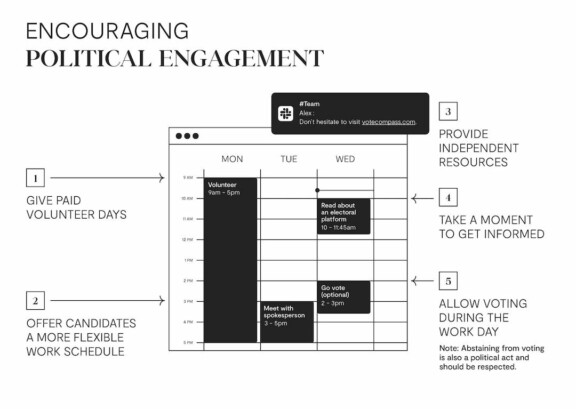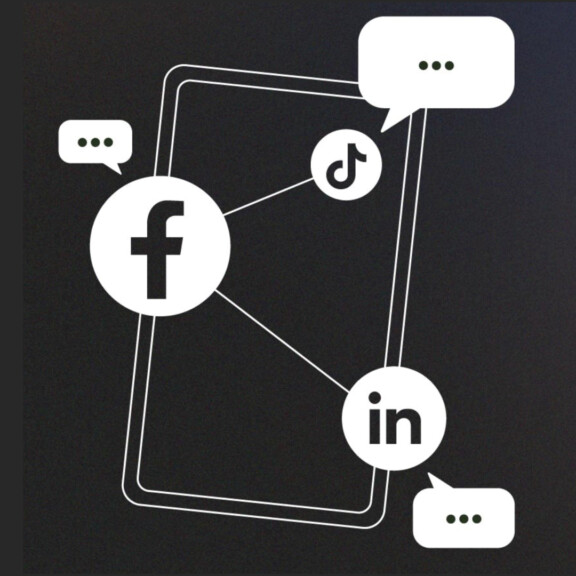Election time: can brands nurture political engagement?

Share:
At Republik, we believe that brands can make a difference by taking concrete actions to improve their environmental and social impact. But a just transition takes political will.
A just transition means greening the economy in a way that is as fair and inclusive as possible to everyone concerned, while creating decent work opportunities and leaving no one behind.
The most recent report by the Intergovernmental Panel on Climate Change (IPCC) confirms: the window of opportunity for limiting global warming to 1.5°C is rapidly closing.
Since we urgently need to act, we must stop trusting companies to act in good faith to take action on social responsibility and enact laws to govern their activities. Such laws would govern the exploitation of natural resources, protect territory or guarantee better working conditions.
Corporate leadership can play a role, especially as elections near, by drawing the attention of future decision-makers to environmental and social issues. Executives can also encourage political and community engagement within their company.
Patagonia: a case study for taking a stand
During the 2020 U.S. Presidential election, a photo of a tag on a pair of shorts from California-based Patagonia went viral on Twitter. The tag stated: “Vote the assholes out.”
Corley Kenna, Patagonia’s Director of Global Communications and Public Relations said in an interview that it was the spontaneous idea of the design team, not a meticulously planned two-year marketing strategy.
“The majority of Americans do think the climate crisis is real, and they do think we should be doing something about it. And it’s our elected leaders that are failing us here. And so, when we say, “Vote the assholes out,” that’s who we’re referring to, is politicians from both parties who deny that climate change is real.”
This political stance during the election was consistent with the company’s values and its long-term actions. Other brands might shy away from such a stance to avoid alienating their partners and/or consumers.
Other companies have encouraged people to get out and vote. American retail giant Foot Locker gave its stores an additional purpose during the 2020 campaign by turning them into voting registration hubs.
Remain vigilant during election time
In Quebec, like the rest of Canada, there are strict laws to govern election spending. In the run up to an election, the rules are fairly flexible. But once the election is called, things get serious.
In La Belle Province, the Élections Québec website states, “With some exceptions, an individual or organization not acting on behalf of a political party or candidate may not make a partisan intervention that involves incurring costs.”
For example, if your company would like to place an ad on Facebook to promote a party’s policy, this expense must be authorized and paid for by the official agent for the party in question. Another example is that one of your employees may not print, at their own expense, posters promoting a candidate in the workplace.
If you think these restrictions are onerous, they’re intended to ensure that all candidates and parties enjoy fair and equal opportunities. They’re also intended to limit the influence of money in politics, to ensure that parties and candidates remain the focus of attention during an election period, and to promote public confidence in democratic institutions.
Encourage all forms of political engagement
Without taking a stand, your company can take some important steps to encourage political and community engagement. For example, you can offer employees paid volunteer days. You can also highlight your team members’ commitment and community involvement.
If one of your employees would like to run for office, your company can support their initiative by welcoming the news and offering them a more flexible work schedule to campaign.
During the election campaign, you can suggest independent resources, such as Vote Compass, to make it easier for employees to find the election platforms of the various political parties.
Ideally, you should give employees time during work hours to get informed. It’s a good way to actively contribute to their political education so they can make more informed choices.
On voting day, you can let your team leave work to vote so they don’t have to wait in line at the end of the day when they’re tired or feeling stressed about having another to-do on a busy weeknight.
It’s important to remember that voting is a political act and some may choose not to vote. Don’t judge those who abstain. You should think about this before your brand wants to encourage people to get out and vote on social media.

The key takeaways
Ordinary people, business people and people in power must take action together to address the climate crisis and reduce social inequality.
Companies can have a positive impact on the political engagement of their employees and audiences. They can also encourage volunteerism in the community and promote political education.
As a social impact creative agency, Republik believes that companies can drive change at all levels, from consumers to elected officials. To do this, we’re committed to:
- Allowing voting during working hours
- Offering two paid hours during elections to learn about party platforms
- Encouraging employee political engagement by supporting their desire to run for office, when appropriate.



